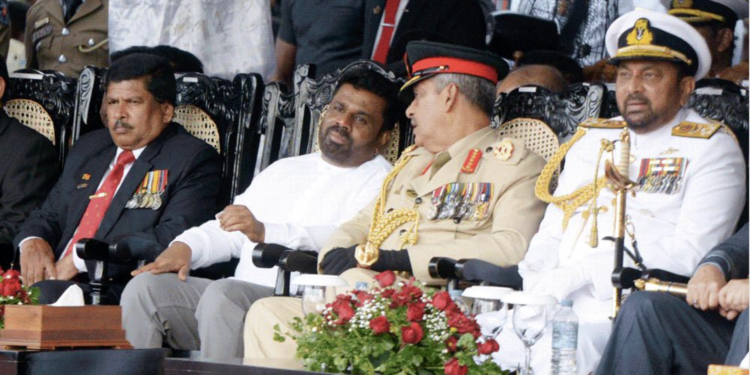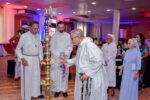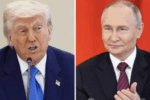Never Again to War: President Dissanayake Calls for Unity Over Division

By Namo Magazine Staff Writer
Colombo, May 19
In a deeply resonant address at the 16th National War Heroes’ Commemoration Ceremony, President Anura Kumara Dissanayake warned that ethnic tension is once again being weaponized in Sri Lanka, not by chance, but by choice, for political gain. Speaking from the War Heroes’ Memorial in Battaramulla, the President delivered a stark and unflinching message: the seeds of division are being sown anew, and it is up to every citizen to choose peace over power.
“Racism is raising its ugly head again, both in the North and the South, not as an organic eruption of anger or grief, but as a tool to acquire and protect power,” he said.
It was a speech filled with both grief and resolve, an appeal to memory, but also a roadmap for the future.
A War Never Meant to Be
The President described the Sri Lankan civil war not as an inevitability, but as a man-made calamity. “The war was not natural. It was created, for power, to protect power, to expand it,” he said. “Children from families who never stirred hatred or called for violence gave their lives for political games they did not start.”
Even as he honored the fallen soldiers who gave their lives to secure peace, President Dissanayake refused to romanticize the conflict. “War is not glory; it is destruction. And in its wake, we are still a nation in recovery, not only economically but morally and emotionally.”
He reminded the nation that the end of armed conflict in 2009 did not translate into complete freedom. “Sri Lanka has not yet gained true sovereignty. Our people remain shackled by economic hardship, corruption, and crime. Real freedom means economic transformation, justice, and a society where law prevails over impunity.”
Honoring the Dead Through the Living
Speaking directly to the families of fallen soldiers, the President’s tone turned intimate and reverent. “To the mothers, fathers, and spouses of our war, heroes you have made a sacrifice that words cannot contain. The only justice worthy of your loss is for us to create a country where no child ever has to die for peace again.”
He urged all communities, Sinhala, Tamil, Muslim, Burgher, and Malay to come together in the spirit of brotherhood. “This memorial is not just a site of mourning. It is a promise. A promise that we will never again allow the fires of hatred to engulf our land.”
Conflict as a Political Currency
The most politically charged moments of his speech were unambiguous. “Conflicts, racism, extremism, these did not emerge naturally. They were manipulated, repackaged, and sold to our people as patriotism,” he said. “I know this personally. The incarceration of Field Marshal Fonseka, someone I once stood with, was not about justice. It was about power. Power, not law, ruled that day.”
His statement drew a direct line between past abuses of power and present dangers. “Peace is now seen as weakness. Reconciliation is being spun as surrender. But let us be clear: there is no future in revenge. Only ruin.”
A Global Mirror
President Dissanayake’s message comes at a time when Sri Lanka’s wartime legacy is also being contested abroad. In Canada, recently open a Tamil Genocide Memorial in Brampton have sparked fierce debate. The original design, a symbolic plant-like structure on a water feature, was revised after facing political pushback. The final design now reflects the Tamil ancestral homeland and includes details of the anti-Tamil violence since 1948.
Tamil diaspora advocates see the monument as overdue recognition. “Genocide denial is the final stage of genocide,” said Rugsha Sivanandan of the National Council of Canadian Tamils. “We have carried intergenerational trauma all our lives. This monument is one step toward justice.”
But the Sri Lankan government has opposed it strongly. The Deputy High Commissioner in Canada, Anzul Jhan, called it a “distorted narration of reality,” accusing Canadian authorities of damaging the reconciliation process by acknowledging only one side of the conflict.
President Dissanayake’s words stand in contrast. He acknowledged the pain on all sides, emphasizing that grief knows no ethnicity. “In the North and South, people still hold photographs of loved ones, still grieve in silence. No one has a monopoly on pain.”
“Let Us Never Allow Division Again”
As he closed his address, the President issued a challenge to the nation: to rise above manipulated narratives and become a country capable of love and solidarity.
“This memorial reminds us that true homage lies in forging unity. Let us vow—never again. Let us replace suspicion and hatred with brotherhood and compassion. Let this be our legacy.”
In a political landscape often characterized by blame and denial, President Dissanayake’s speech was a call to maturity—a recognition that peace is not the absence of conflict but the presence of justice, dignity, and shared purpose.
Namo Magazine
Thoughtful Politics. United People. Real Peace.







